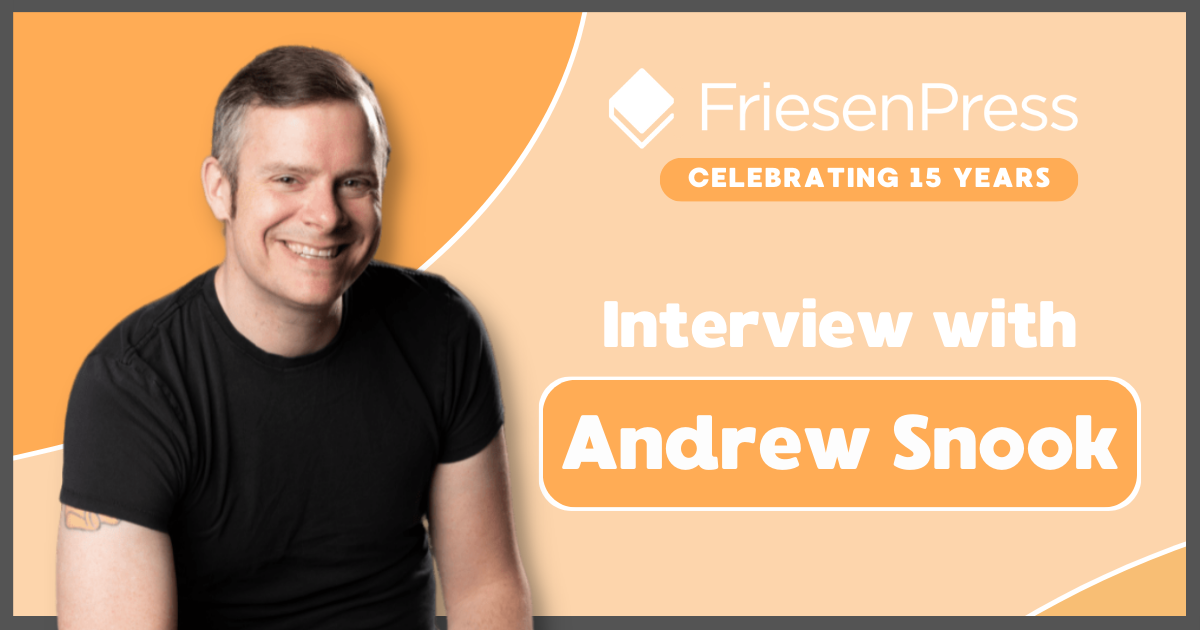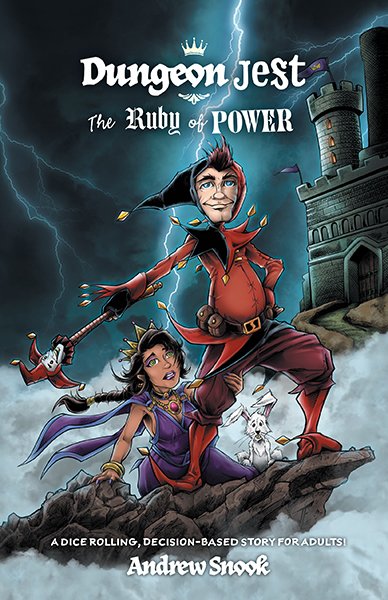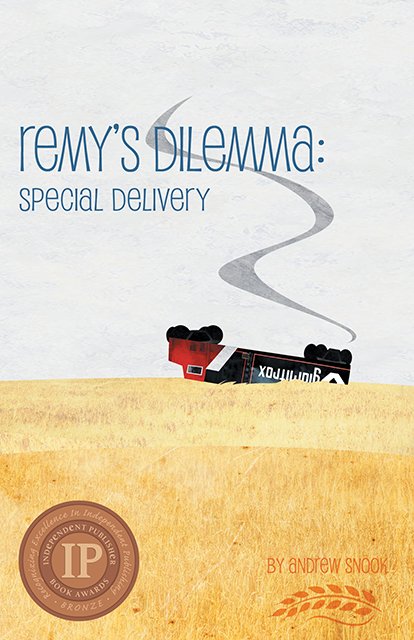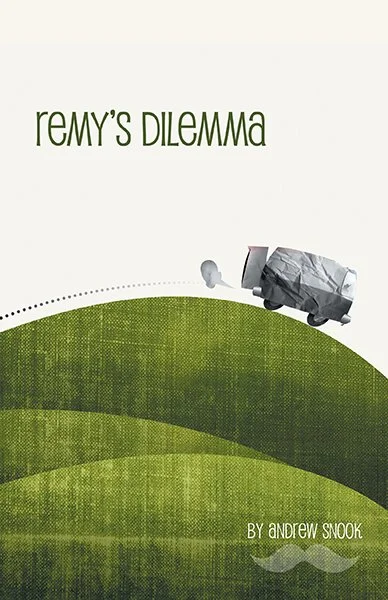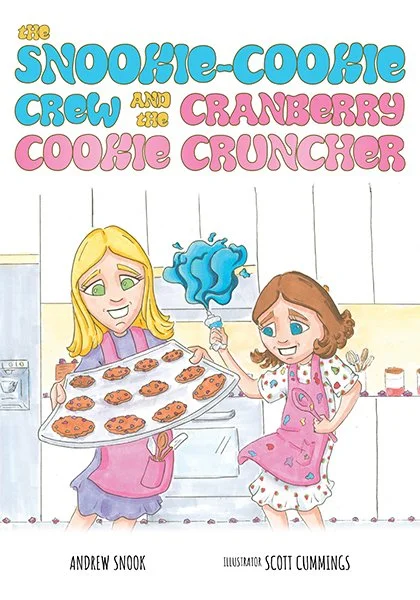Pages to Press: An Interview with Author & Magazine Publisher Andrew Snook
/For many authors, a book’s publication is just the beginning of the story.
In celebration of our 15th year in the publishing services business, we’re catching up with authors whose remarkable projects and careers have grown and evolved alongside us over the years.
For our first edition, we’re speaking with the award-winning, Mississauga-based humour writer, business reporter, and (now) magazine publisher, Andrew Snook!
Andrew has been a FriesenPress author since 2015 when he released Remy’s Dilemma, the first book in his Remy Delemme series of funny mystery books. In the ensuing years, he’s published another installment in the Remy series, a children’s book, and a dice-rolling fantasy adventure book (with many more projects currently on the go). But all that creative production might not have happened if not for a dream he experienced in his early twenties.
We spoke with Andrew mere weeks after he marked another milestone on his long list of writing accomplishments: the launch of Canadian Independent Publishers magazine. In our wide-ranging conversation, we trace the evolution of his writing career, explore why launching this author-focused magazine was so important to him, and ask him for (what turns out to be) excellent publishing advice for aspiring authors:
Let’s start at the beginning: how long have you been writing fiction?
One of my favorite classes growing up was creative writing. I loved writing stories. I’d put my classmates into stories all the time — sometimes they liked it, sometimes they didn’t [laughs]. By high school, writing fell off for me, and it disappeared for a while.
I rediscovered it while I was attending Acadia University in Nova Scotia. One day, I woke up from this crazy dream and had this spark. I thought, “I have to write about this.” So, I grabbed my laptop and sat at the kitchen table in my apartment, and I wrote for 12 hours. The dream just rolled into more random things that this character who popped into my head was doing.
I kept writing this character’s adventures for about eight months, and ended up putting it together as a novella called Wasted Days. It was not well written, I’ll say that right now [laughs]. I didn’t know a lot about writing [at the time].
I found it years later in a box when I moved to the Ottawa area. I thought, “There’s a lot of fun ideas in here!” I had learned more about writing at that point and decided to rewrite it. For about three years, I kept the skeleton and tore it apart. That became my first full length novel, Remy’s Dilemma, which I released in 2015.
Some authors have dreamt about publishing a book since childhood; is it fair to say that was something that hadn’t dawned on you until later in life?
Definitely. I was in my early thirties when I started taking writing more seriously. When I had written the first draft of the initial Remy book, I started researching various [publishing] avenues. Should I go through a traditional publisher? Should I look at going independent? I did a lot of research about it.
I sent the manuscript out to a few small publishing houses, and I got very encouraging responses from them. The general consensus from everyone I spoke with was that it was well written and funny, but they felt like the market wasn’t big enough for this type of book because it was so Canada-centric. Which, I understood — you only publish books you think you can sell.
While I was getting those notes back, I was looking into the potential for independent publishing and hybrid publishing, where you start off as an independent and maybe later on get traditionally published. I discovered FriesenPress during that research and reached out. I really liked that I was able to get my books printed in Canada; that was a big part of jumping into independent publishing with FriesenPress.
By day, you’re a business writer and reporter for various magazines and newspapers. Do you approach book writing differently than your day job? How do those two creative practices coexist?
My journey as a professional writer and as a fiction writer certainly go hand in hand because a lot of what I’ve learned in each world has helped the other one. I went back to school at 30 for journalism in 2010. Other than my wife, most people thought this was a very bad idea because journalism was in the [poor] shape it was. It’s still struggling now, but it’s something I really wanted to try.
I always say the community papers [I started at] taught me how to write fast, and the business-to-business (B2B) magazines taught me how to write well. In the world of business writing, the most important thing is that everything is accurate and well written. It should be that way for everything, but time constraints with daily papers can make [writing] challenging at times. Whereas, in the B2B space, you have more time to focus on longer features.
With readers, it’s kind of a Jekyll and Hyde situation, because I’ve had people who have read my business writing open up one of the Remy books and go, “wait — this is you?" And I’ve had people do the opposite. They are very different writing styles.
One of the best reader reactions I got from the Remy books was during a fan expo. A reader came up to me and said, “I read your first book. That was the most chaotic book I’ve ever read.” And then they bought the second one!
You’ve written in many different genres — from juvenile fiction to mystery novels for adults, and now an award-winning dice-rolling fantasy book. What inspires your leaps from genre to genre?
Life, I guess! The Remy books are silly action adventures, full of Canadiana. A lot of it was inspired by travelling around the country for work, which I’ve done a lot of over the years. I’ve spent a lot of time in little nooks and crannies of each province. That’s definitely helped inspire those books.
For the game book, we homeschooled our kids during COVID; my youngest was two during that time and he got into the toddler sleeping habits all my kids followed: wake up at 3 a.m., party till 7, and then fall back asleep. So that was my routine for six to eight months.
I really wanted to write during those months, but I couldn’t write the third Remy book. It was too hard with all the kids at home and all the chaos of trying to homeschool them while balancing work and everything. I couldn’t sit down and concentrate and write the way I needed to.
That’s when I thought of a game book: Dungeon Jest. I grew up loving books where you could battle monsters with dice rolling so it’s something I’ve always wanted to do. The timing was perfect because you only need to write a small section at a time. When I would take my son downstairs at 3, I’d bring a notepad and pencils with me, because you can’t use a computer around a toddler. I wrote the whole thing by hand and typed it up later. The editing process was long, because in addition to traditional editing, you’ve got to gameplay it to ensure all the possibilities flow and make sense. Though long, it was a lot of fun to put together.
Are any other genre experiments on your bucket list? What are you working on now?
I’ve actually started working on a second Dungeon Jest book already, along with the third Remy book that will finish the series. I was commissioned to write a nonfiction book, which I can’t talk too much about, but I’ve got that on the go as well.
One thing I really enjoyed this past year was teaching a writing workshop at a local school to get kids in Grades 1 to 6 excited about creative writing. It was a lot of fun — the kids seemed to really like it and the parents were really happy.
I’ve also always wanted to teach at the college or university level, so I’m currently doing my MFA in creative writing as well, to get the credentials to teach so I can give it a shot.
I love talking to people about writing and giving advice from some of the experiences that I’ve had over the years. I’m 45 now, and my first foray into independent publishing started almost 20 years ago; I’ve learned some things that I can share to help guide people, make their [publishing] adventures a little easier, and avoid a couple of mistakes. I’ve certainly made some of those. I’m just hoping all of that works out.
I’m excited, too, because the thesis of my MFA is to write a work of fiction, so I love it. I’m in my wheelhouse, and I’ve got lots of books on the go.
Having tried your hand at many different story archetypes, do you have a favourite that you enjoy playing in?
Dungeon Jest was my first step into the fantasy genre. As a game book, it’s a little different, but I love that sort of medieval magic and monster world. I could definitely see myself writing more in that universe. For my MFA, I’ve also been mapping out a post-apocalyptic novel, which I’m really excited about because I’ve always been fascinated with post-apocalyptic worlds.
That said, I feel like no matter what I write, there’ll always be at least some ridiculous humour
attached to it. It’s just who I am.
You’ve been publishing your books with FriesenPress since 2015, and we’ve loved working with you. What draws you back to FriesenPress for each successive book?
I love the quality of the prints. All my print runs have been done at Friesens. I sell the majority of my books in print, at book signings and comic-cons and fan expos, and things like that. I love having a book with that quality look to it; it doesn’t look any different than anything else you pick up at your local bookstore. Quality is super important to me. I also like the way FriesenPress formats and designs the books. The designers do a really nice job of putting things together.
And I really love that I’m supporting a Canadian company. FriesenPress was founded in Victoria. You’ve got your printing facilities in Altona, Manitoba — and I’ve been there! I’ve visited the print shop to check it out. As a Canadian writer and someone who’s made their career in the publishing sector, it’s really, really important to me to support that. Every country should have a strong publishing sector. As Canadians, I think we need to support Canadian publications and Canadian publishing houses as much as we can.
Speaking of which, let’s talk about Canadian Independent Publishers magazine, which you just launched this month at When Words Collide in Calgary. Why was creating this publication so important to you?
It’s really important to me. I’ve spent 20 years in the world of independent publishing, from my first poorly written novella till now, as an author making a living writing fiction and nonfiction. And I’ve always felt like [this magazine] is something that’s been missing. There’s not a lot of resources that showcase Canadian independent writers.
I think I understand why a lot of mainstream media stays away from that; there is still a stigma that comes with indie publishing. Many question indie books’ quality, a concern people don’t have about traditional publishing. And it’s fair; I’ve seen independently published books that are as beautifully written, well edited, and no less quality than what you’ll find in traditional publishing. But I also find books that are very poorly written and possibly not edited at all.
That is where the challenge is for independent authors. How do you separate yourself? If you’re someone who is putting the time and the resources into making your book as good as anything that’s being traditionally published, how do you break away from that divisive reputation that self-publishing and independent publishing can have?
I wanted to create a platform that showcases those talented authors that are putting forth those efforts to have properly edited, well-designed, and beautifully illustrated books. I also think it’s important to showcase the partners who do a lot to support independent authors — from indie bookstores to book marketing professionals to companies like FriesenPress — such as offering services that help independent authors achieve those quality books. And I didn’t feel like there was ever a place to help independents grow as authors, increase their sales, and become more legitimate and successful.
I’ve written four books and I’ve had good luck with some of them doing very well. I've got 13 national or international writing awards for my independent fiction, which helps differentiate myself from some authors. But outside of awards, there aren’t a lot of ways for authors to differentiate themselves. Also, submitting to a lot of awards competitions can be challenging because it’s cost prohibitive. I think awards are important, and I 100% support finding reputable awards to submit your book to, but it’s not viable for everyone.
With [Canadian Independent Publishers magazine], there’s no cost for people to be showcased. There’s no financial barrier. The purpose is to showcase and legitimize Canadian authors who are putting forth the effort to create well-written books and give them a platform where they can be shown. I understand how hard it can be to get yourself out there and promote yourself, especially when there’s not a lot of avenues. I want to create a platform that makes it easier for people to do that.
What are you most proud of as a published author?
I’m just happy that I’m putting together books and that people are getting good laughs from them. One of the proudest feelings came from a book signing at a Chapters Indigo store years ago. I was approached by a young woman that had previously purchased Remy’s Dilemma about a year before. She told me that she had a special bookshelf in her bedroom for when she’s had a really hard day, and that my book was on that shelf. She told me that she likes to open it up and read it when she has a really bad day because it makes her feel lighter. How do you get a better compliment than that?
Given the focus of Canadian Independent Publishers magazine, and your interest in teaching, do you have any publishing tips to share?
Do your research. Take your time to look at the different options available. One of the reasons I chose FriesenPress was that I ordered a few of their authors' books. I chose [books] at random and I had them mailed to me. I also had other publishers mail theirs to me and I compared the quality of the prints. That may seem a bit odd to some people, but spending $50 on ordering books from different people to test out the quality of the prints is not a big investment when you’re thinking about investing larger amounts of money. Look at the different types of print options available and ensure they look professional — especially if you’re someone focused on selling in bookstores.
Don’t ever sacrifice quality for cost; in my opinion, if it’s not going to be done well, don’t bother because you won’t be happy in the end. If you put your heart and soul into a book, you need to make sure that the final product is exactly what you want. That takes time, and it’ll take a little money as well. But it’s an investment you need to make because, if you don’t have that quality, you will not have that same satisfaction when you’re holding the final product in your hand.
And don’t rush it. You’re going to want to rush it — I know, I get it. I did that with my first novella. It’s exciting, and you want people to read the amazing thing you just wrote. But please take the time to get it professionally edited. Sometimes it takes several editors. I have two editors and a line critiquer I use for my Remy books.
Finally, don’t release it early. Take the time to make sure it’s the quality you want. When you get to the point where you’re nearing a final product, and you feel like you’re making changes just for the sake of making changes, that’s when you’re probably ready to hit the press — but not before. That’s my advice.
We’re celebrating 15 years in the publishing industry, and look forward to 15 more. As we wrap up here, Andrew, where do you hope your writing career takes you in the future?
There’s always that hope that I will, eventually, have some books traditionally published. It’s not because I don’t enjoy the independent publishing process; I do love it. But the economic reality is if somebody paid me to write books, I could write a lot more books [laughs]. I have lots of book ideas. It's more about time and money to make it happen. My dream would be to write books all day, but the only way that happens is if somebody pays you to write them. So that’s part of it.
I also want to teach writing. It’s such an important medium; everyone has exciting stories to share. I think a lot of people want to share their stories, but may be nervous about their skillset or ability to tell them. I want to get people excited about writing, and keep them excited about writing.
Most of all, I want to write books that make people happy and feel better. I add my little drop of happiness into the world. I feel like it’s important to have those outlets — I certainly have them for myself. Books and music are huge parts of my life, and I want to be able to share something that reaches other people. I guess that’d be my goal: just keep writing fun stuff.
###
Dungeon Jest available now.
Visit snookbooks.com to learn more.
Follow Andrew Snook on Twitter and Instagram.


